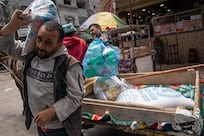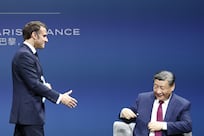These days, there are concerns that technology will render people idle and professions obsolete. I would like to ask why. This issue would make a great topic for a book, but it has to come from somebody who is willing to research this topic.
Lots of ideas – some crazy, some useful, some practical – have ended up in works of literature. There is always a “why” that needs to be answered. This is what writers do.
In their book, Darwin’s Sacred Cause, authors Adrian Desmond and James Moore began by asking: why would a young medical student become so bedazzled by a few weird animals that he would write an entire treatise on those species? The writers conclude that Charles Darwin’s hatred of racism and slavery provided the motivation that drove him to develop his theories.
Even in this age of the internet and false knowledge, there are still ample opportunities to answer some basic questions. This is what writers are for.
The talks at last month’s Sharjah International Book Fair caused a lot of sparks to fly. They came from a concerned community whose frustrations, ideas and experiences could culminate in new books, podcasts and radio programmes, and inspire young people to do research and develop and design solutions for the future. So what’s next?
“Why do we have to read when we have YouTube?” This question was raised by an audience member during one session.
This is a difficult question. One of the reasons is that the video may have been put together by a child as part of a school project, or it might be so short that it is missing important details. You might think that you know what is going on, but in a video you might only get hints – such as a few names and dates – instead of the details that would be available in a 500-page book.
The decree issued by the President, Sheikh Khalifa, easing the cost of publishing and distribution of books will encourage budding writers. Still, how will all of them find the time for quality writing? There should be more grants and opportunities for writers and researchers.
As author and translator Savas Senel noted, during Ottoman times writers were paid by the government to produce literature. This tradition should be revived to help us produce meaningful and beneficial research and knowledge. Creating a market for such works is the next task.
Isobel Abulhoul, OBE, CEO and Trustee of the Emirates Literature Foundation and Director of the Emirates Airline Festival of Literature, bemoaned the condition of the book market in the Arab world.
She asked: “How can you expect publishers to market books if the average sales of any title across the Arab world is only 55,000 copies, while in the UAE it is just 3,000?”
Then there is the problem of getting your book published, especially if it is assumed even before writing the book that it’s not going to be worth publishing.
While the publishing industry is in better shape than it was a decade ago, more needs to be done to encourage authors, both Emirati and expatriate, to write quality fiction and non-fiction in all the languages spoken here.
Some people might think that winning awards is one way to get readers interested in a writer’s work, but this can backfire.
Jamal Al Shehhi, an Emirati writer, says: “Awards help neither writers nor readers. This is a problem in the Emirates. A book might win a prize, but that’s not necessarily an indication that the book is of great quality.
“In fact, such books are often not of the best quality – and when someone picks them up and finds this out, then they lose interest in buying that particular author any more or even any prize-winning books again.”
These challenges need to be overcome so as to ensure a better future for writers and publishers in this country and the region.
Maryam Ismail is a sociologist and teacher





